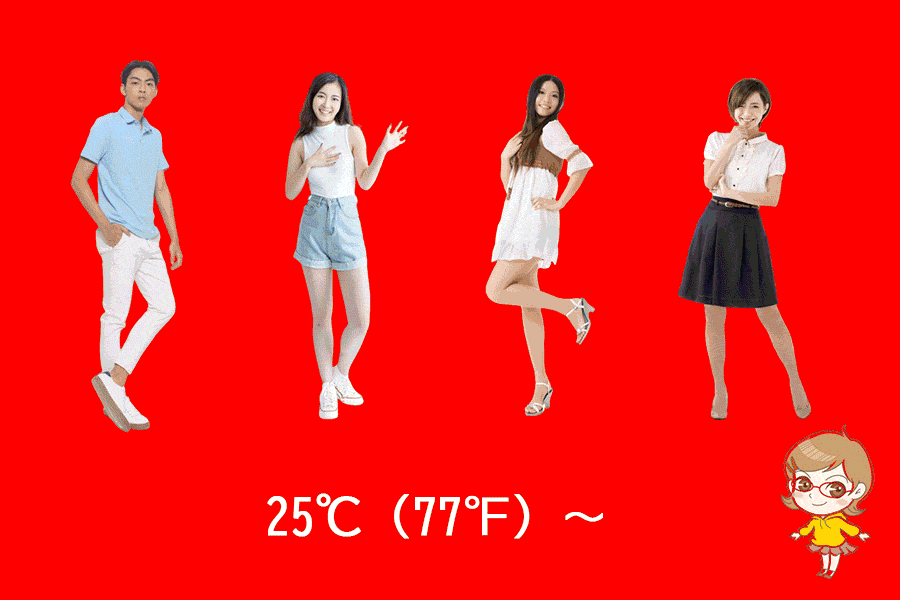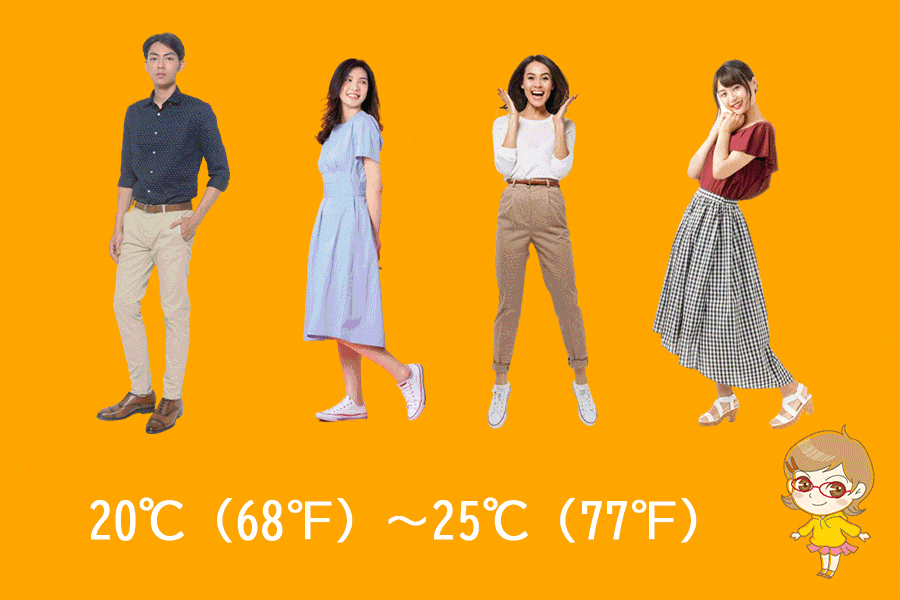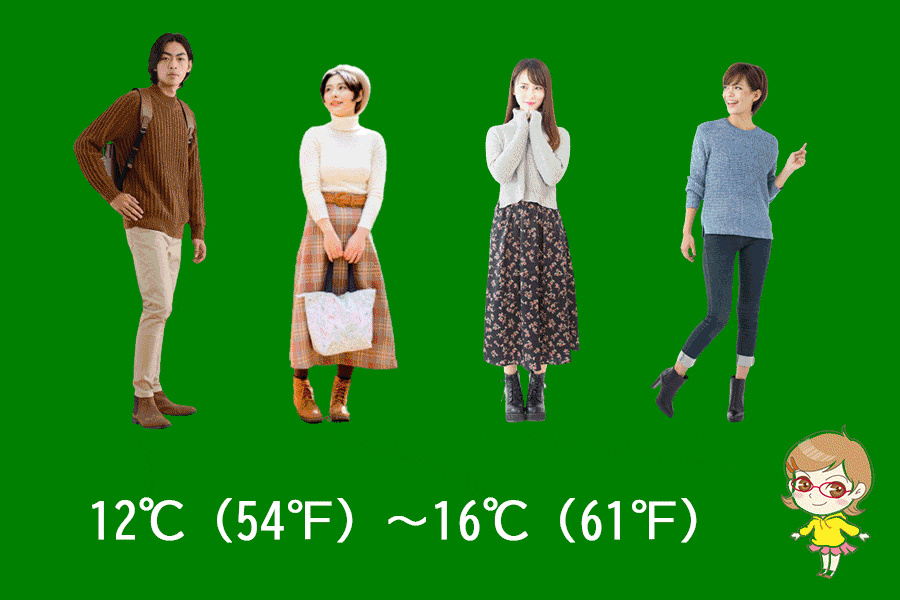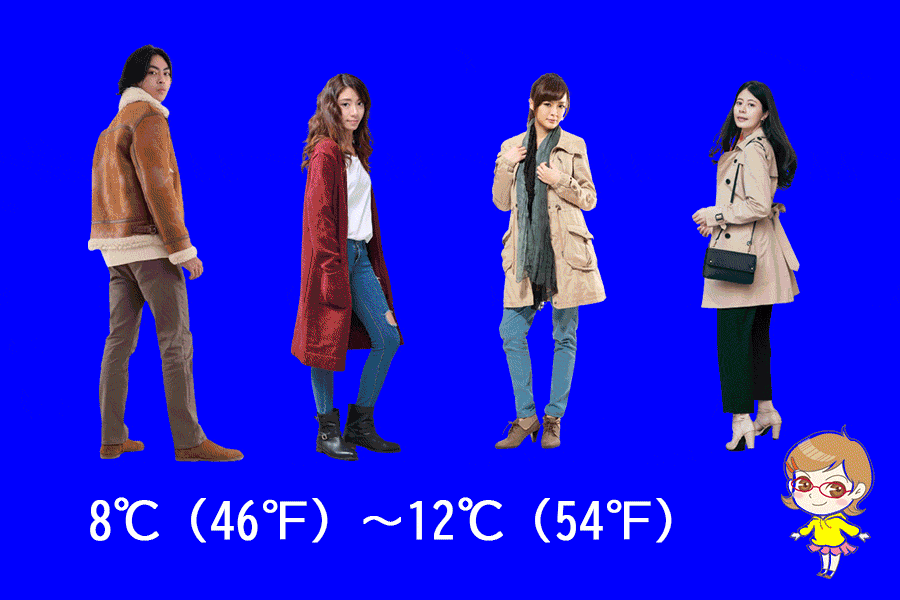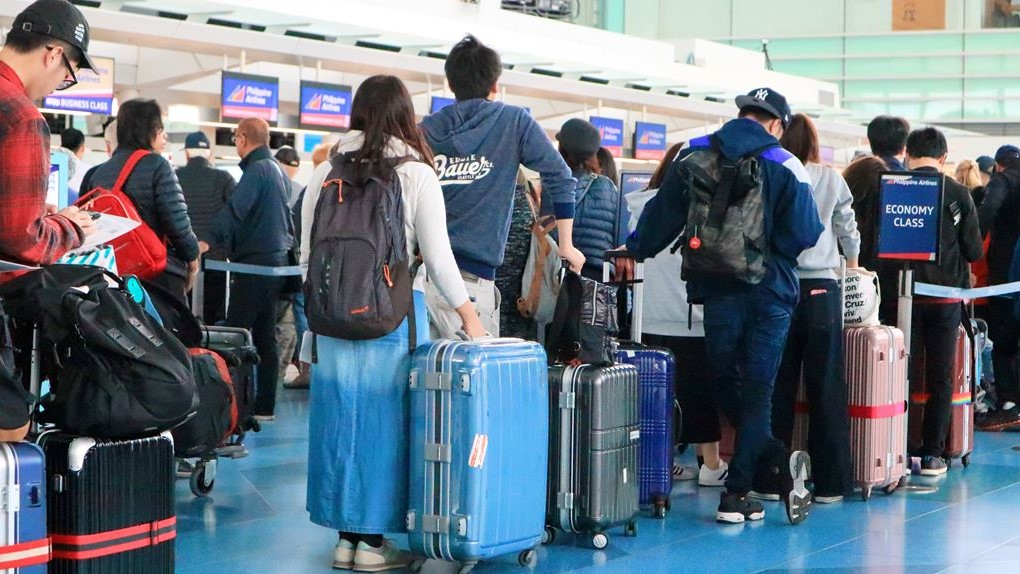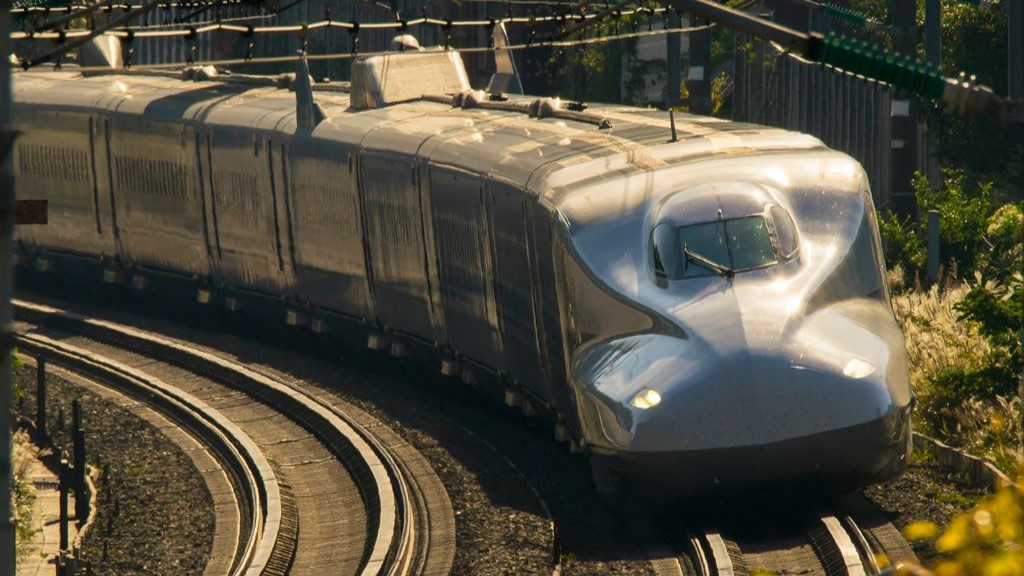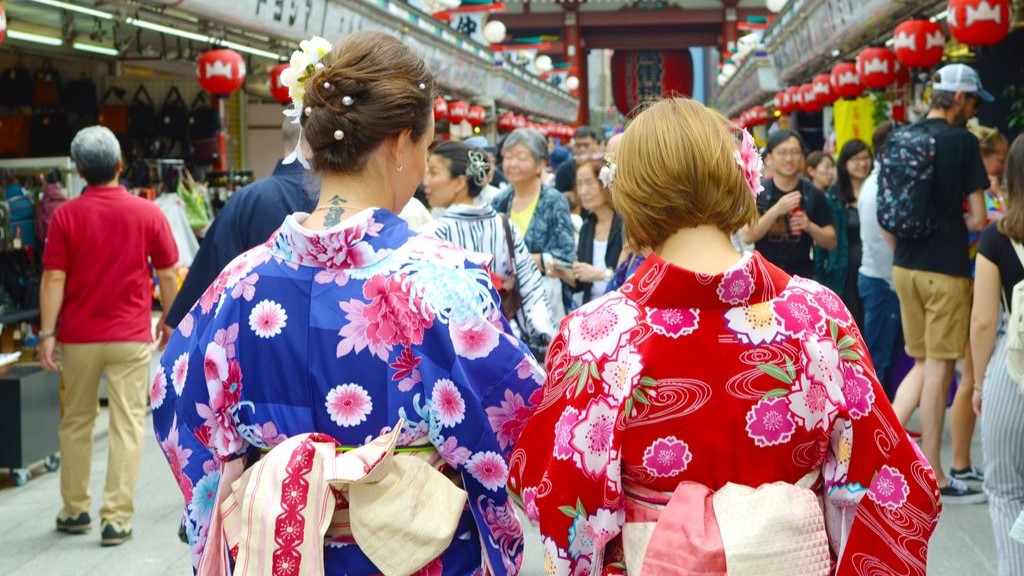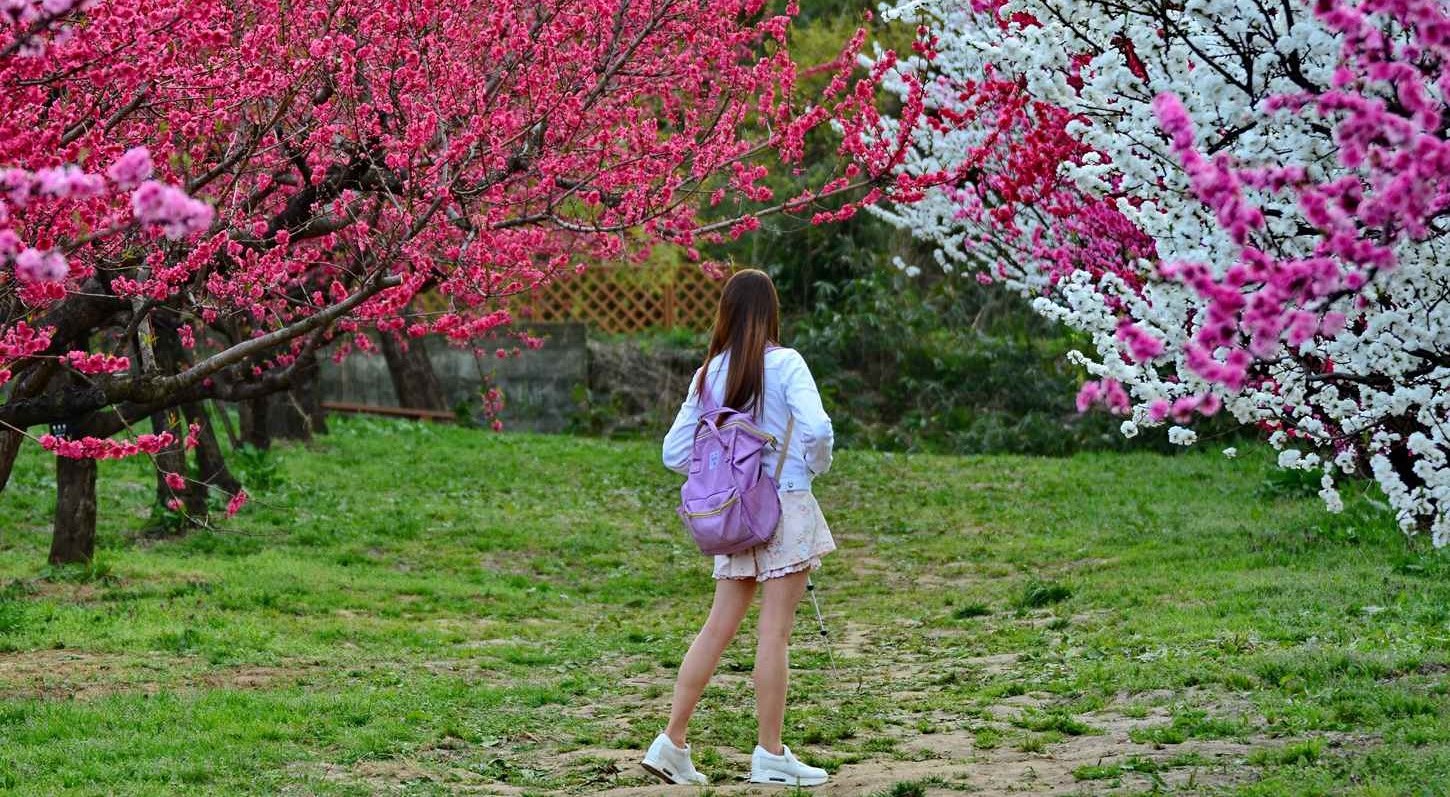1-1 Kinoshinbocho, Kanazawa City, Ishikawa Prefecture 920-0858 MAP
↓ Click to jump to the relevant section.
| Current Weather | Annual Weather | Tourist Attractions |
| Baggage Deposit | Hotels |
Current weather and clothing
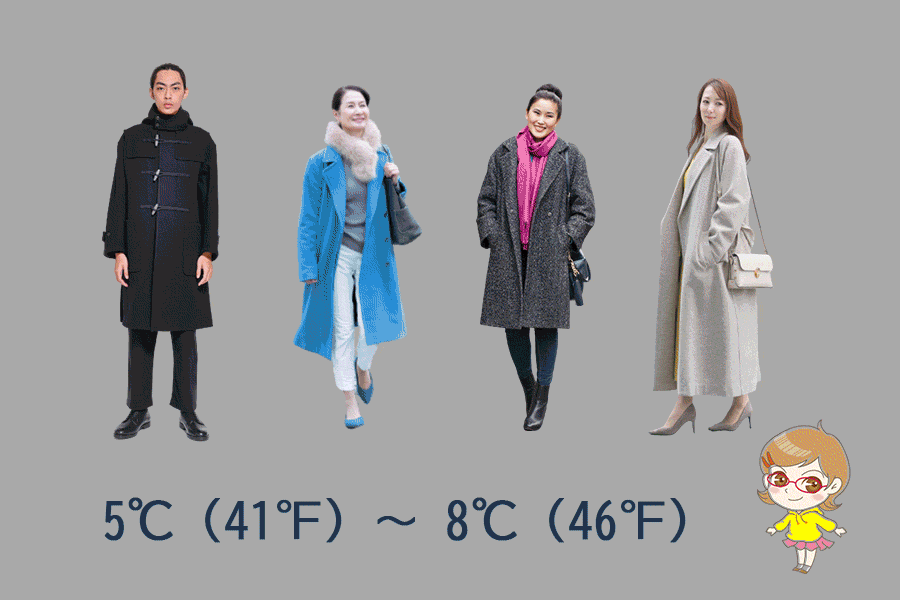
The weather information shown here is the information closest to the station in question. Please note that there may be slight differences.
Yearly temperature changes and recommended clothing
Clothing recommendations for each temperature range
When traveling in Japan with the following average temperatures, the recommended clothing is as follows:
Monthly changes in temperature, precipitation, and snowfall (1991~2020 average, Japan Meteorological Agency survey)
| Jan. | Feb. | Mar. | Apr. | May | Jun. | Jul. | Aug. | Sep. | Oct. | Nov. | Dec. | |
| temperature(°C) | 4 | 4.2 | 7.3 | 12.6 | 17.7 | 21.6 | 25.8 | 27.3 | 23.2 | 17.6 | 11.9 | 6.8 |
| precipitation(mm) | 256 | 162.6 | 157.2 | 143.9 | 138 | 170.3 | 233.4 | 179.3 | 231.9 | 177.1 | 250.8 | 301.1 |
| snowfall(cm) | 67 | 53 | 13 | 0 | — | — | — | — | — | — | 1 | 24 |
Winter
December
December is a cold month in Kanazawa Station with an average temperature of 6.8°C and an average precipitation of 301.1 mm, which includes snowfall. It is recommended to wear heavy clothing such as warm jackets, sweaters, and pants, as well as a hat, gloves, and a scarf. Waterproof and slip-resistant shoes are also recommended due to the occasional snow and ice on the ground.
January
Kanazawa Station has a cold in January. The average temperature during this month is 4 degrees Celsius. Snow is often a common occurrence. It is advisable to wear warm and thick winter clothes such as a heavy coat, a scarf, gloves, and a hat to stay warm. Men and women are recommended to wear thick winter coats made of wool or fur. Layering with a sweater, a jacket, and a long-sleeved shirt inside the coat can also be beneficial. Winter boots with good grip will provide traction and warmth to the feet.
February
In February, the average temperature is slightly higher than January, at 4.2 degrees Celsius. Snow is often a common occurrence. Although it is still cold, it is less dry than in January. People are recommended to wear warm winter clothes, but they can wear slightly lighter clothing than January. It is still essential to wear a warm coat, a scarf, and gloves to stay comfortable. For men and women, a thick woolen or fur coat is recommended to wear. The layers underneath the coat should be enough to keep the body warm. Winter boots with good grip are still a must to prevent slipping on the icy sidewalks.
Spring
March
In March, the temperature begins to rise, with an average of 7.3 degrees Celsius. It is still chilly, but the temperature is more pleasant than the previous months. In March, it is advised to wear lighter clothes than winter, but people should still wear warm clothing. It is a good idea to wear a light coat, a long-sleeved shirt, and a sweater. A scarf and gloves are still recommended. For men, a light wool coat, a sweater, and a pair of pants would be comfortable. For women, a long coat, a dress, or a sweater with a skirt or pants would be appropriate. Boots or closed shoes are still recommended to keep the feet warm.
April
The temperature continues to rise in April, with an average temperature of 12.6 degrees Celsius. The climate is mild in this month, with occasional rain. A lightweight coat, a sweater, or a long-sleeved shirt with a scarf and gloves would be suitable clothing. For men, a light coat, a pair of pants, and a shirt are good options, while women can wear a dress or a skirt with a blouse. A pair of closed shoes would be appropriate, but it would be better to bring an umbrella for rainy days.
May
In May, the weather becomes warmer, with an average temperature of 17.7 degrees Celsius. The climate is still mild, but it can be rainy. A light coat, a long-sleeved shirt, or a sweater with a scarf would be comfortable. For men, a shirt with a pair of pants, or a light sweater with a coat would be good options. Women can wear a dress, a skirt, or a blouse with a jacket. Closed shoes or sandals would be appropriate.
Summer
June
June is a warm month with an average temperature of 21.6 degrees Celsius. It is a comfortable temperature with occasional rain. People can wear a T-shirt or a light sweater, shorts, or pants. For men, it would be comfortable to wear a T-shirt or a light shirt with a pair of shorts or pants. For women, a T-shirt or a blouse with shorts or a skirt is a suitable option. It is also a good idea to bring a light raincoat in case of rain.
July
The average temperature in July is 25.8°C in Kanazawa Station. It is a wet month, with an average precipitation of 233.4 mm. Humidity is high, and there are occasional typhoons that can cause heavy rainfall and strong winds. It is recommended to wear light, breathable clothing such as cotton T-shirts, shorts, and skirts. Don’t forget to bring a hat, sunglasses, and sunscreen to protect yourself from the strong UV rays.
August
August is also hot and humid, with an average temperature of 27.3°C and an average precipitation of 179.3 mm. The recommended clothing is similar to that of July, with light and breathable clothing being essential. It is important to wear waterproof clothing or carry an umbrella as it may rain suddenly.
Autumn
September
September marks the beginning of autumn in Kanazawa Station, with an average temperature of 23.2°C and an average precipitation of 231.9 mm. The weather is still warm and humid. It is recommended to wear comfortable and breathable clothing such as T-shirts and light pants, as well as a light jacket or sweater for cooler mornings and evenings.
October
October has an average temperature of 17.6°C and an average precipitation of 177.1 mm. The weather is cooler, but still mild with occasional rain. It is recommended to wear long-sleeved shirts, light sweaters, and jackets, as well as pants or jeans. A light scarf or hat can also be useful to protect yourself from the cooler breeze.
November
November has an average temperature of 11.9°C and an average precipitation of 250.8 mm. The weather is getting colder and the leaves are starting to change colors. It is recommended to wear warmer clothing such as sweaters, jackets, and pants. Layers are essential for the fluctuating temperatures, and a hat and gloves are useful to keep your head and hands warm.
Recommended tourist destinations
Kenrokuen Garden
1-1 Marunouchi, Kanazawa 920-0937 Ishikawa Prefecture
Kenrokuen Garden is one of the three most famous gardens in Japan and is a special national scenic beauty spot. It is known as a representative garden of the Edo period (1603-1867). During the “Yukisuri” (snow hanging) period in winter, visitors can enjoy the tasteful scenery of pine trees with ropes strung like umbrellas. The plum and cherry blossoms in spring and the autumn leaves in fall are also worth seeing. Enjoy a sweet treat or lunch at one of the many teahouses while getting close to the beautiful nature.
Higashichaya Old Town
1 Higashiyama, Kanazawa 920-0831 Ishikawa Prefecture
Higashi Chaya-gai is a must-visit spot where you can stroll through Kanazawa’s typical scenery. Renting a kimono and walking around is also recommended.There are so many attractive stores to choose from when shopping for souvenirs. Take a look around at traditional Kanazawa crafts, cute Japanese sundries, delicious-looking confections, and much more.
Ochaya Shima
1-13-21 Higashiyama, Kanazawa 920-0831 Ishikawa Prefecture
Shima is a cultural facility located in Higashi Chaya-gai, a teahouse building built in 1820 and designated as a National Important Cultural Property. Visitors can learn about the culture of the teahouse, which was a social gathering place for merchants of the time. In the rooms, which have been preserved as they were since the Edo period (1603-1867), you can almost hear the sounds of shamisen (three-stringed Japanese banjo) and taiko (Japanese drum). Matcha green tea and seasonal sweets are served while enjoying the view of the tsuboniwa garden.
Kanazawa Castle
1-1 Marunouchi, Kanazawa 920-0937 Ishikawa Prefecture
Kanazawa Castle was the residence of Maeda Toshiie, a warlord representing Kanazawa. The restored Hishiyagura, Gojyumen Nagaya, Hashizume-mon Gate, and Kawakita-mon Gate can be seen today, and in 2020 the Nezumita-mon Gate and Nezumita-mon Bridge were completed, making it a new highlight of the castle.
Ninja Weapon Museum
Nomachi 2-26-1, Kanazawa 921-8031 Ishikawa Prefecture
This museum exhibits and introduces weapons related to the ninja. The museum exhibits about 160 items of 50 different types, including shuriken, chain weapons, and armor. There is also a “Shuriken Experience” corner. In the souvenir store, imitation swords and ninja goods are popular.
Nagamachi Neighborhood
The Naga-machi Buke Yashiki (Samurai Residence) Ruins is a tourist attraction full of Kanazawa’s unique atmosphere that invites travelers to enjoy the sights and sounds of Kanazawa. Visitors can enjoy the mysterious sensation of being transported back in time to the days when the Kaga feudal clan lived in this area. There are also souvenir shops and cafes, making it a perfect place for a stroll.
Myoryuji – Ninja Temple
1-2-12 Nomachi, Kanazawa 921-8031 Ishikawa Prefecture
Myoryuji Temple, also known as “Ninja Temple,” is an architectural highlight, built in the style of a ninja house. Visitors can see the inside of the building by appointment. Visitors can see interesting and mysterious tricks such as pitfalls and hidden staircases.
Omicho Market
50 Kamiomicho, Kanazawa 920-0905 Ishikawa Prefecture
Omimachi Market has a history of more than 300 years in Kanazawa, dating back to the era of the feudal government. About 170 stores line the market, selling seafood such as crab, which is a representative of Hokuriku cuisine, as well as fruits and vegetables, meat, processed foods, and daily necessities. Many restaurants also line the street, attracting many tourists who come to enjoy Kanazawa’s typical seafood bowls, sushi, and set menus.
Oyama Shrine
11-1 Oyama-machi, Kanazawa 920-0918 Ishikawa Prefecture
Oyama Shrine is dedicated to Toshiie Maeda, the founder of the Kaga domain, and his wife, Omatsu, and is the focus of the “Hyakumangoku Procession,” a samurai parade event held in June in which celebrities appear dressed as Toshiie and Omatsu. The shrine pavilions, which incorporate foreign cultures, are also a major attraction. The shrine gate, which uses Japanese, Chinese, and Western styles, has stained glass windows and is also beautiful at night when illuminated, making it a symbol of Kanazawa.
21st Century Museum of Contemporary Art
1-2-1 Hirosaka, Kanazawa 920-8509 Ishikawa Prefecture
The 21st Century Museum of Contemporary Art, Kanazawa, with its eye-catching circular architecture of modern design, is a museum that symbolizes the City of Arts. The museum has received high acclaim both in Japan and abroad for its friendly and ingenious exhibits of challenging contemporary art. The “Swimming Pool” by Leandro Erlich is especially popular, with tickets selling out quickly.
Where to leave your luggage
At Kanazawa Station, coin lockers are scattered throughout the station, but many are located in the “Anto” shopping center adjacent to the station.
To get to “Anto”, exit the ticket gate and head in the opposite direction.
There are also coin lockers and baggage storage facilities in the corridor on the way to “Anto”.
The baggage deposit area is open from 9:30 a.m. to 7:00 p.m.
Recommended hotels and inns
Hyatt Centric Kanazawa
1-5-2 Hirooka, Kanazawa 920-0031 Ishikawa Prefecture
3-minutes walk from Kanazawa Station
Hotel class: 4
Hotel style: Business
Check Rates & Availability:
>> See on Tripadvisor
>> See on Trip.com
>> See on Expedia
Hotel Nikko Kanazawa
2-15-1 Hommachi, Kanazawa 920-0853 Ishikawa Prefecture
4-minutes walk from Kanazawa Station
Hotel class: 4
Hotel style: City View , Quiet
Check Rates & Availability:
>> See on Tripadvisor
>> See on Trip.com
>> See on Expedia
ANA Crowne Plaza Kanazawa, an IHG hotel
16-3 Showa-Machi, Kanazawa 920-8518 Ishikawa Prefecture
3-minutes walk from Kanazawa Station
Hotel class: 4
Hotel style: Quiet , Business
Check Rates & Availability:
>> See on Tripadvisor
>> See on Trip.com
>> See on Expedia
Kanazawa Tokyu Hotel
2-1-1 Korimbo, Kanazawa 920-0961 Ishikawa Prefecture
1.1mi/1.8km from Kanazawa Station
Hotel class: 4
Hotel style: Centrally Located , Modern
Check Rates & Availability:
>> See on Tripadvisor
>> See on Trip.com
>> See on Expedia
Kanazawa Hakuchoro Hotel Sanraku
6-3 Marunouchi, Kanazawa 920-0937 Ishikawa Prefecture
1.1mi/1.8km from Kanazawa Station
Hotel class: 4
Hotel style: Classic , Family
Check Rates & Availability:
>> See on Tripadvisor
>> See on Trip.com
>> See on Expedia
Daiwa Roynet Hotel Kanazawa
2-20 Horikawashimmachi, Kanazawa 920-0849 Ishikawa Prefecture
3-minutes walk from Kanazawa Station
Hotel class: 3
Hotel style: Modern , Business
Check Rates & Availability:
>> See on Tripadvisor
>> See on Trip.com
>> See on Expedia
HOTEL MYSTAYS PREMIER Kanazawa
2-13-5 Hirooka, Kanazawa 920-0031 Ishikawa Prefecture
6-minutes walk from Kanazawa Station
Hotel class: 3
Hotel style: Quiet , Modern
Check Rates & Availability:
>> See on Tripadvisor
>> See on Trip.com
>> See on Expedia
Kanazawa Saino Niwa Hotel
2-4-8 Nagata, Kanazawa 920-0043 Ishikawa Prefecture
13-minutes walk from Kanazawa Station
Hotel class: 3
Hotel style: Trendy , Quiet
Check Rates & Availability:
>> See on Tripadvisor
>> See on Trip.com
Mitsui Garden Hotel Kanazawa
1-22 Kamitsutsumicho, Kanazawa 920-0869 Ishikawa Prefecture
16-minutes walk from Kanazawa Station
Hotel class: 3
Hotel style: Romantic , Business
Check Rates & Availability:
>> See on Tripadvisor
>> See on Trip.com
>> See on Expedia
Hyatt House Kanazawa
1-5-2 Hirooka, Kanazawa 920-0031 Ishikawa Prefecture
3-minutes walk from Kanazawa Station
Hotel class: (new)
Hotel style: Business
Check Rates & Availability:
>> See on Tripadvisor
>> See on Trip.com
>> See on Expedia
We support your itinerary planning!
Click the button to get an overview of hotel information and popular tourist routes from all over Japan featured on our site. We’ve included comprehensive details to aid in planning your trip, so please make use of it.
Comprehensive checklist before traveling to Japan
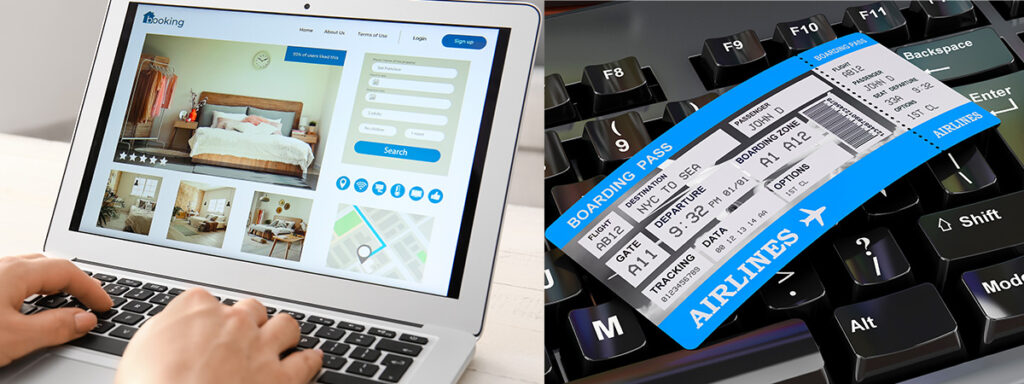
Book flights
Compare and purchase flight tickets
When planning your trip to Japan, it's advisable to start by researching flights several months in advance. Airlines often release promotional fares, especially during off-peak seasons. Use comparison sites like Skyscanner or KAYAK to get a sense of the price range. Be flexible with your travel dates if possible; flying mid-week might be cheaper than on weekends.
>> Visit Skyscanner's official website
>> Visit KAYAK's official website
Order Japan Rail Passes for each family member
Purchase your Japan Rail Pass before departure
The Japan Rail (JR) Pass offers unlimited travel on JR trains, making it a cost-effective option for tourists. However, it's only available to foreign tourists and must be purchased *before* you arrive in Japan. Determine the areas you plan to visit; if you're traveling extensively, a nationwide pass is beneficial, but if you're only exploring a specific region, consider regional JR passes. Children under 12 get a discounted pass, so ensure you order the correct type for each family member.
>>Visit Japan Rail Pass's website
Plan your attire for Japan
Check the weather at your destination on this site
Japanese weather varies significantly by season. In summer, it's hot and humid, so breathable clothes are essential. Winters, especially in the north, can be cold, requiring warm attire. If visiting during the rainy season (June to early July), pack a good umbrella and waterproof shoes. While Japan is generally casual, certain places like temples, shrines, or upscale restaurants may require modest and neat dressing.
Reserve a pocket Wi-Fi or SIM card
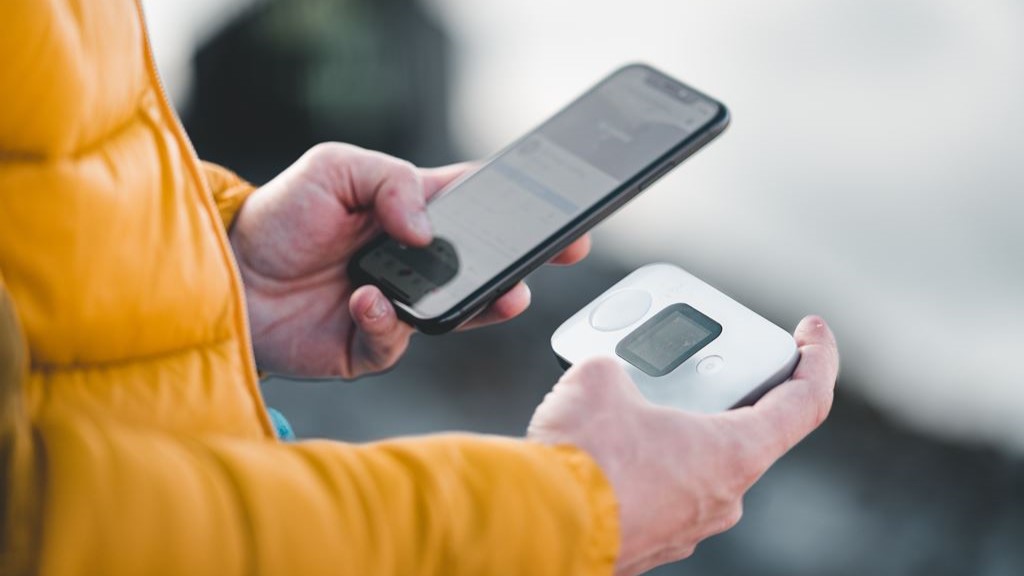
SIM card or pocket Wi-Fi is required
Beyond clothes, consider packing essentials like a universal power adapter (Japan uses Type A and B sockets), portable Wi-Fi or SIM card for internet access, and any necessary medications (with a copy of the prescription).
Which is better: a SIM card or pocket Wi-Fi?
When traveling in Japan, one essential to consider is securing internet access, especially given that many locations still don't offer free Wi-Fi. To ensure you can use your smartphone throughout your trip, you'll typically have three options: (1) a SIM card, (2) pocket Wi-Fi, or (3) the roaming service provided by your mobile company. Roaming services can be quite expensive, so we often recommend using a SIM card or pocket Wi-Fi. While SIM cards tend to be more affordable than pocket Wi-Fi, they can be trickier to set up. Pocket Wi-Fi, on the other hand, can be shared among several users, making it a favorable choice for families or groups.
▼SIM card
Advantages:
Relatively affordable.
Disadvantages:
Can be time-consuming to set up initially.
May have strict data limits.
▼Pocket Wi-Fi
Advantages:
Offers substantial data allowances.
A single device can be shared among multiple users.
Easily usable with PCs as well.
Disadvantages:
Typically more expensive.
Japan's representative services
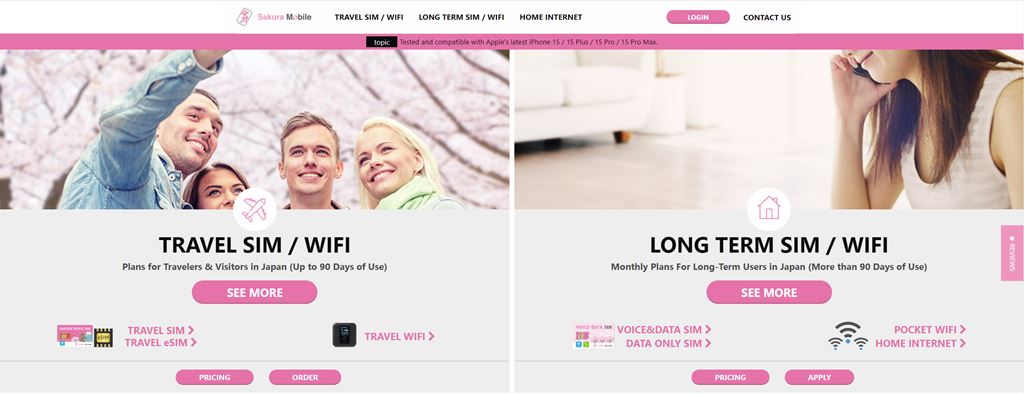
Sakura Mobile's website
▼SIM card
>>Visit Sakura Mobile's official website
>>Visit mobal's official website
▼pocket Wi-Fi
>>Visit Sakura Mobile's official website
>>Visit NINJA WiFi's official website
>>Visit Wi-Fi RENTAL Store's official website
Book local tours as needed
Pre-book your tour and have a great trip!
Local tours offer deep insights into Japan's culture and heritage. Websites like Viator or GetYourGuide offer a variety of tours, from traditional tea ceremonies to modern pop culture tours in Akihabara. Consider unique experiences like staying with monks on Mt. Koya or taking a cooking class to learn authentic Japanese dishes.
>>Visit Viator's official website
>>Visit GetYourGuide's official website
Purchase advance tickets for popular attractions
Make a reservation to avoid crowds
Attractions like Tokyo Disneyland, Universal Studios Japan, or the Studio Ghibli Museum often have long ticket queues. Buy tickets online in advance to save time. Some attractions also have timed entry, so check the specific time slots available and plan accordingly.
▼Tokyo Disney Resort
>>Visit Tokyo Disney Resort official website
>>Visit Viator's Tokyo Disneyland page
>>Visit Viator's Tokyo DisneySea page
>>Visit GetYourGuide's Tokyo Disneyland page
>>Visit GetYourGuide's Tokyo DisneySea page
▼Universal Studios Japan
>>Visit USJ official website
>>Visit Viator's USJ page
>>Visit GetYourGuide's USJ page
Buy travel insurance

insurance concept, health, life and travel insurance
It is important to be prepared for emergencies
While Japan is a safe country, travel insurance is crucial for unforeseen events like health emergencies, travel disruptions, or lost baggage. Ensure your policy covers medical expenses in Japan, as healthcare, though excellent, can be expensive.
Here we introduce online travel insurance services that are popular worldwide.
World Nomads: An online travel insurance service widely endorsed by travelers worldwide. They offer plans that cover adventurous activities and high-risk sports.
>>Visit World Nomads' official website
AIG Travel Guard: An insurance service available to travelers all over the world. They offer a wide range of options, including cancellation protection and emergency medical insurance.
>>Visit AIG Travel Guard's official website
Share your itinerary with emergency contacts
Organize your reservation information
Keep a digital and printed copy of your detailed itinerary, including hotel addresses, train schedules, and booked tours. Share this with a trusted family member or friend not traveling with you.


